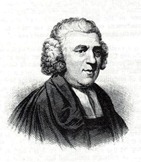Amazing Grace – John Newton

“Amazing Grace” was written by John Newton. He was born on July 24, 1725, in London, England, and he died there on December 21, 1807.
This is probably the most popular hymn in the English language—a television documentary was even made about it. Perhaps it is because its words so well describe the author: John Newton was a slave trader before coming to Christ. It was sung at the funeral of American president Ronald Reagan.
His mother died when he was six years old, and he joined his father at sea when he was eleven. He served his apprenticeship as a sailor, and rose through the ranks until he became the captain of a slave ship. He abandoned the religious training that he had experienced as a child, and reveled in the dissolute life of a slave trader. He was noted for his profanity and his cruelty.
But one stormy night, when his ship was in danger of sinking and he was in danger of dying, Newton had a real change of heart. It might have been his religious training at his mother’s knee surfacing after all those years –– or it might have been his love for Mary Catlett, a Christian woman whom he later married –– or it might have been his reading of the book, Imitation of Christ, by William Law –– or it might have been all three. In any event, Newton had a real conversion experience.
He began to treat both the slaves and his crew with a good deal more compassion. Later, he left his ship and took a job onshore when he was convinced that the slave trade was wrong.
He then felt a call to the ministry, and was ordained at age forty and assigned to a church at Olney, England. He continued in ministry through the rest of his long life, even after failing eyesight made it impossible for him to read.
This hymn, Amazing Grace, is in a sense Newton’s own story. It was amazing grace that saved him, and it was amazing grace that was the focus of his preaching. But Amazing Grace is the story of every Christian. It is amazing grace that saves us –– nothing else –– no works of our hands or gifts of our wealth. It was amazing that God would love and save John Newton, but it is amazing that God would love and save any of us. It is indeed a sweet sound to hear about it, but it is so amazing that it is hard to believe. Believe it, because it is true.
Amazing grace! How sweet the sound
That saved a wretch like me!
I once was lost, but now am found;
Was blind, but now I see.’Twas grace that taught my heart to fear,
And grace my fears relieved;
How precious did that grace appear
The hour I first believed!Through many dangers, toils and snares,
I have already come;
’Tis grace hath brought me safe thus far,
And grace will lead me home.The Lord has promised good to me,
His Word my hope secures;
He will my Shield and Portion be,
As long as life endures.Yea, when this flesh and heart shall fail,
And mortal life shall cease,
I shall possess, within the veil,
A life of joy and peace.The earth shall soon dissolve like snow,
The sun forbear to shine;
But God, who called me here below,
Will be forever mine.When we’ve been there ten thousand years,
Bright shining as the sun,
We’ve no less days to sing God’s praise
Than when we’d first begun.
Notes: This hymn was probably composed between 1760 and 1770 and put in the Olney Hymns. “Amazing Grace” was possibly one of the hymns written for a weekly service. Through the years other writers have composed additional verses to the hymn, and possibly verses from other Newton Hymns have been added. However, there are the six stanzas that appeared, with minor spelling variations, in both the first edition in 1779 and the 1808 edition, the one nearest the date of Newton’s death. It appeared under the heading “Faith’s Review and Expectation,” along with a reference to I Chronicles 17:16-17.
Sources:
www.cyberhymnal.org
www.preparingforeternity.org
www.lectionary.org
Share this content:
1 comment